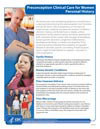Clinical Care for Women
Personal History
All women who are considering pregnancy should have a screening history during the preconception visit. Providers should ask about risks to pregnancy on the basis of maternal age, maternal and paternal medical conditions, obstetric history, and family history. Ideally, a three-generation family medical history should be obtained for both members of the couple, with the goal of identifying known genetic disorders, congenital malformations, developmental delays or intellectual disability. If this screening history indicates the possibility of a genetic disease or disorder, specific counseling should be given, which might include referral to a genetic counselor or clinical geneticist.
Family History
Individuals identified as having a family history of developmental delays, congenital anomalies, or other genetic disorders should be offered a referral to an appropriate specialist to better quantify the risk to a potential pregnancy.
Known Genetic Conditions
Suspected genetic disorders might require further workup prior to conception. Known or discovered genetic conditions should be managed optimally before and after conception.
Prior Cesarean Delivery
Preconception counseling of any woman with a previous cesarean delivery should include counseling about waiting at least 18 months before the next pregnancy and about possible modes of delivery so she enters the next pregnancy informed of the risks and options. Ideally, the counseling should begin immediately after the cesarean delivery and continue at postpartum visits.
Prior Miscarriage
Women with a history of miscarriage should be reassured of a low likelihood of recurrence and offered routine preconception care. Women with three or more early losses should be offered a workup to identify a cause. Therapy that is based on the identified cause can be undertaken. For women with no identified cause, the prognosis is favorable with supportive care.
Prior Preterm Birth
A pregnancy history should be obtained from all women of reproductive age. Women with a history of a preterm or low-birthweight infant should be evaluated for remediable causes to be addressed before the next pregnancy and should be informed of the potential benefits of treatment with progesterone during subsequent pregnancy.
Prior Stillbirth
At the time of a stillbirth, a thorough investigation to determine the cause should be performed and communicated to the patient. During the preconception visit, a woman with a previous stillbirth should receive counseling about the increased risk of further adverse pregnancy outcomes and might require referral for support. Any appropriate workup to identify the cause of the previous stillbirth should be performed if it was not done as part of the initial workup. Risk factors that can be modified before the next pregnancy should be addressed (e.g., tobacco use).
Uterine Anomalies
A woman with a uterine septum and poor previous reproductive performance should have the condition corrected hysteroscopically before her next conception. All other anomalies call for specific delineation of the anomaly and any associated vaginal and renal malformations. Although surgical correction might be advised in some cases, heightened awareness and surveillance during a subsequent pregnancy and labor should help optimize outcomes.
More Information
To see the complete list of the preconception clinical content and description of how the content was selected and rated, please read the full article.
Contact Us:
- Centers for Disease Control and Prevention
1600 Clifton Road
Atlanta, GA 30333 - 800-CDC-INFO
(800-232-4636)
TTY: (888) 232-6348
New Hours of Operation
8am-8pm ET/Monday-Friday
Closed Holidays - cdcinfo@cdc.gov



